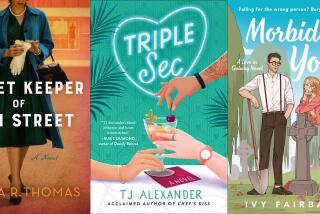DISCOVERIES
Walk the Blue Fields
Stories
Claire Keegan
Black Cat: 170 pp., $13 paper
Sometimes writers lose their ferocity, their edge, with a second book. It’s good to see that Claire Keegan, whose first story collection, “Antarctica,” was unforgettable, has not. These stories, set in a modern-day, ever-ancient Ireland, are more about lack of love than love. “His faith has not faltered,” the author writes of the priest in the title story, whose secret lover has just married a young buck from the village, “that’s what’s strange -- but he wishes God would show himself. All he wants is a sign.” Keegan can be cold but not cruel -- hope lurks somewhere in almost all her stories.
Many have a kind of deceptive sheen, “nothing stronger than habit,” as she describes the ill-fated courtship of two naive characters. You start out on the paths of these simple, rural lives, and not long into each, some bit of rage or unforgivable transgression bubbles up: the prepubescent girl forced to share her father’s bed, the beloved dog returned to its rightful owner by the deceiving parent, a stranger’s misplaced anger. Then the truly amazing happens: Life goes on, limps along, heads for some new chance at beauty.
--
Train to Trieste
A Novel
Domnica Radulescu
Alfred A. Knopf: 308 pp., $23.95
“Ihave left the Black Sea, my skin golden and salty, and my hair tangled brighter from the sun, to take the train that crosses the land by the violet-blue sea and the sunflower fields near Bucharest, then cuts through mountains into resin-pungent forest.” So begins this vivid debut novel, alive with the youthful awareness of the texture of the old world, the world left behind -- in this case, Romania. Mona is just 17 when she falls in love with her “green-eyed mountain boy,” Mihai. The adult world -- Ceausescu’s government, secret police, parents in political peril -- is closing in on them both. But for one beautiful summer, it’s linden trees and vodka made from fermented plums and stars and mountains and raspberries.
Mona leaves Romania on the train to Trieste without saying goodbye to Mihai, whom she suspects has joined the secret police. She goes on to a life in Chicago -- a husband, children, a doctorate and, of course, years later, she returns. There’s a certain inevitability (if not predictability). But for a few days, just drink in the gorgeous scenery; the Carpathians, Bucharest, the dark forests. Suspend all cynicism and believe in the possibility of this love story.
--
I Don’t
A Contrarian History of Marriage
Susan Squire
Bloomsbury: 248 pp., $25.99
“T h e INTERTWINED story of women and marriage is largely filtered through a testosterone prism.” Susan Squire is a bit daunted by the vastness of the task she sets for herself. Clearly, the institution is faulty and, as a vessel for love, fidelity and DNA, getting leakier by the hour. Until men figured out where babies came from, group sex was the norm. From that point on, women were considered dangerous and unreliable; marriage became a way of oppressing and enslaving them. Squire starts in the Book of Genesis -- “your husband . . . shall rule over you” -- and moves on to classical Greece, where the belief that females were simply a lesser version of males informed all manner of oppression. In early Christianity, marriage became an antidote to rampant lust, a way of keeping everyone in his or her place. Fears of impotence, witchcraft and cuckoldry in medieval and Renaissance times created anti-female hysteria.
Squire is fascinated by the concomitant depiction of women as weak and silly yet powerful and dangerous. She ends somewhat abruptly with Martin Luther’s hopeful and revolutionary belief in the importance of marriage for love, not simply procreation. It’s a fascinating, complex subject. Squire muddies it up a bit with a constant smirking sarcasm, hence the “contrarian” in the subtitle. I’d like to know how this thing evolved without the constant finger-pointing. Call it lambs to the slaughter, but every day, for some reason, thousands say, “I do.”
--
More to Read
Sign up for our Book Club newsletter
Get the latest news, events and more from the Los Angeles Times Book Club, and help us get L.A. reading and talking.
You may occasionally receive promotional content from the Los Angeles Times.







